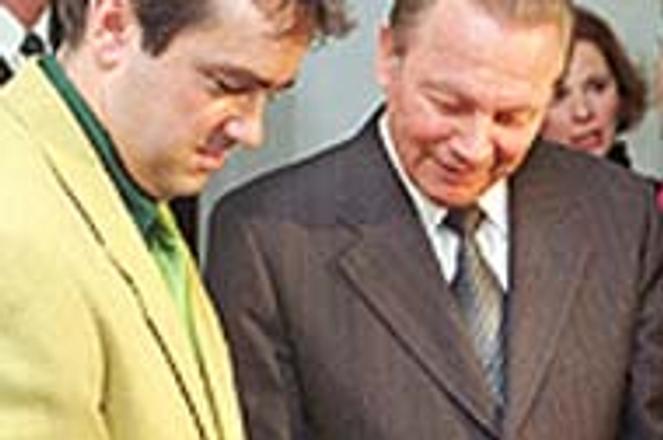President Rudolf Schuster helps comedian Jozef Pročko baptize a new book.photo: TASR
Slovak President Rudolf Schuster is again in trouble with ruling coalition politicians, this time for writing a book of recent memoirs scheduled to be released December 21. The book, called 'A Return to High Politics,' describes negotiations in September 1998 on the formation of the ruling coalition and the alleged attempt of three coalition parties to keep the Hungarian party out of government.
Prime Minister Mikuláš Dzurinda, when presented with a draft of the book, recommended that Schuster not publish it, calling it "a very unfortunate step." Deputy Prime Minister Pavol Hamžík, currently chairman of governmental Party of Civic Understanding (SOP) that Schuster founded in 1998, said the book offers readers "a one-sided view which doesn't correspond to reality."
Hamžík is criticized in High Politics as conducting himself during coalition negotiations as though he already led the SOP.
Although Schuster defended his book as an attempt to informrather than divide society, political observers have been severely critical of both the timing and content of the work.
"It's very unusual for a president to write a book on political negotiations which in fact still have a significant impact on Slovak politics," said Grigorij Mesežnikov, president of the Institute for Public Affairs (IVO) think tank on December 15. "I don't know any other serious European politician who would do such a thing."
Beyond washing the government's dirty laudry in public, the president has also been taken to task over his calls for a political roundtable of parliamentary parties, and for asking to be kept informed of government decisions. Even the president's former party mates in the SOP have said that Schuster is overstepping his powers as an executive branch official.
"The president should represent the country but not govern the country, " said Peter Kresák, an SOP Member of Parliament and an expert on constitutional law. According to Kresák, the president's attempts to increase his executive role by meeting politicians personally are "unfortunate and unusual."
Schuster has a long history in executive politics. Before 1989, he was chairman of Regional Council of Košice County, eventually rising to become a member of the Central Committee of the Slovak Communist Party. After the revolution, he served as the first Speaker of the Slovak Parliament, Czechoslovak Ambassador to Canada, Mayor of Košice city, chairman of the SOP and, as of June 1999, the President of Slovakia.
It is as president that Schuster's executive power ambitions have created the most friction, particularly his desire to play a role in daily government decisions.
"According to the original [1993] Slovak Constitution, the president had the right to preside over government sessions, but in January 1999 we withdrew this paragraph from the Constitution," Kresák said.
In Kresák's opinion, Schuster's call for a roundtable of political parties was an attempt to get around Constitutional limitations on contact with the government.
Schuster met Jozef Migaš, the chairman of the ruling Party of the Democratic Left (SDĽ) and Parliamentary Speaker, on December 14, but has said that he will only hold a full roundtable if all parliamentary parties agree. For now, the ruling SDK and Hungarian party have said they will not participate.
"I don't think it's a good idea. Presidents usually organise such meetings in case of a government crisis, but we have no such situation here, " the IVO's Mesežnikov said.


